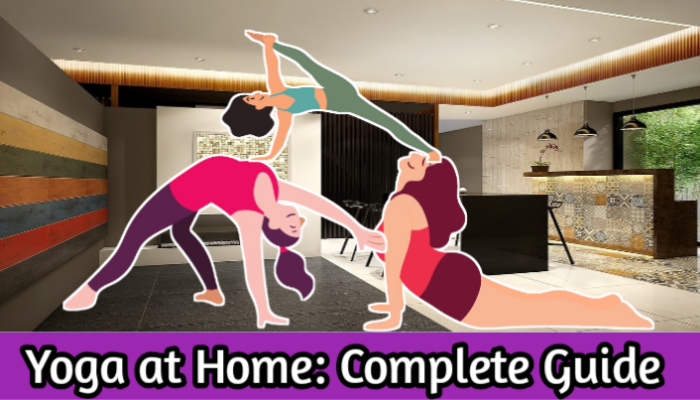Yoga at home is a convenient and effective way to improve physical fitness, mental clarity, and emotional well-being. Yoga at Home Complete Guide With busy schedules and limited access to studios, home yoga allows you to practice anytime, at your own pace, and in a comfortable environment.
1. Preparing for Yoga at Home
1.1 Choosing the Right Space
- Select a quiet, clean, and well-ventilated area
- Ensure enough space to stretch arms and legs comfortably
- Optional: Use calming elements like candles, incense, or soft lighting
1.2 Yoga Equipment
- Yoga mat for comfort and grip
- Optional props: blocks, straps, blankets, or cushions
- Comfortable clothing that allows free movement
1.3 Setting a Routine
- Choose a fixed time daily to build consistency
- Start with short sessions (15–20 minutes) and gradually increase
2. Types of Yoga You Can Practice at Home
2.1 Hatha Yoga
- Gentle postures, stretching, and relaxation
- Suitable for beginners and stress relief
2.2 Vinyasa / Flow Yoga
- Dynamic, flowing sequences linked with breath
- Builds strength, stamina, and cardiovascular fitness
2.3 Yin Yoga
- Long-held passive poses targeting deep connective tissue
- Promotes flexibility, relaxation, and joint health
2.4 Restorative Yoga
- Supported poses using props for relaxation
- Ideal for recovery, stress relief, and mental calmness
2.5 Power Yoga
- High-intensity, fitness-oriented yoga
- Builds strength, endurance, and core stability
2.6 Meditation and Pranayama
- Breath-focused exercises and mindfulness
- Reduces anxiety, improves focus, and enhances energy
3. Benefits of Practicing Yoga at Home
3.1 Physical Benefits
- Increases flexibility, strength, and balance
- Improves posture and core stability
- Boosts circulation, metabolism, and energy
3.2 Mental Benefits
- Reduces stress, anxiety, and mental fatigue
- Enhances focus, concentration, and mindfulness
3.3 Emotional Benefits
- Promotes emotional balance and resilience
- Encourages self-awareness and relaxation
3.4 Lifestyle Benefits
- Saves travel time and costs
- Offers flexibility to practice anytime
- Helps build a consistent daily routine
4. Home Yoga Warm-Up
4.1 Gentle Stretching
- Neck rolls, shoulder rotations, and wrist stretches
- Prepares muscles and joints for asanas
4.2 Breathing Awareness
- Focus on deep, rhythmic breaths to calm the mind
- Helps prepare for a more focused yoga session
5. Sample Yoga at Home Routine
5.1 Beginner Routine (15–20 minutes)
- Mountain Pose (Tadasana) – 1 min
- Cat-Cow Pose – 2 min
- Downward Dog – 2 min
- Child’s Pose – 2 min
- Seated Forward Bend – 2 min
- Tree Pose – 1 min per side
- Corpse Pose (Savasana) – 5 min
5.2 Intermediate Routine (30 minutes)
- Sun Salutation A & B – 5 min
- Warrior I & II – 3 min each side
- Triangle Pose – 2 min each side
- Plank & Side Plank – 2 min each
- Bridge Pose – 2 min
- Cobra Pose – 2 min
- Savasana – 5–10 min
5.3 Advanced Routine (45 minutes)
- Combine Vinyasa flows, Power Yoga poses, core exercises, balance poses, and extended Savasana
- Incorporate Pranayama and meditation at the end
6. Breathing Techniques (Pranayama)
6.1 Diaphragmatic Breathing
- Deep inhalation and exhalation using the diaphragm
- Enhances oxygen flow and relaxes the body
6.2 Alternate Nostril Breathing (Nadi Shodhana)
- Balances energy channels and calms the mind
6.3 Ujjayi Breathing
- Slow, controlled breathing during yoga flow
- Boosts endurance and mental focus
7. Meditation for Home Practice
7.1 Mindfulness Meditation
- Focus on breath or sensations
- Helps reduce stress and improve focus
7.2 Guided Visualization
- Use apps, videos, or music for visualization exercises
- Enhances relaxation and mental clarity
7.3 Mantra Meditation
- Repeating a word, phrase, or sound (e.g., “Om”)
- Supports concentration and spiritual connection
8. Tips for Effective Home Yoga
8.1 Create a Routine
- Set a specific time daily to practice
- Short, consistent sessions are better than occasional long sessions
8.2 Minimize Distractions
- Turn off phones or notifications
- Inform family members to respect your practice time
8.3 Use Online Resources
- YouTube, apps, or online classes can guide beginners
- Follow certified instructors for correct alignment and safety
8.4 Listen to Your Body
- Modify poses to avoid strain or injury
- Take breaks if needed
8.5 Combine with Lifestyle Habits
- Healthy diet, hydration, and adequate sleep enhance yoga benefits
9. Conclusion
Yoga at Home Complete Guide Practicing yoga at home is a flexible, cost-effective, and holistic approach to improve physical, mental, and emotional health. By combining asanas, breathing exercises, and meditation, you can:











uku1hf